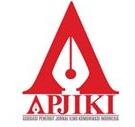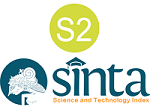Reputation in the age of disruption: A case study of PT Pos Indonesia
Abstract
Background: The age of disruption is inevitable nowadays, forcing companies to adapt to the current challenges and situations to stay relevant. PT Pos Indonesia is one of the companies experiencing negative impacts, resulting in decreased work performance, corporate stability, and even corporate reputation. Therefore, PT Pos Indonesia must swiftly retake the market narrative and improve its reputation. Purpose: The present study aimed to analyze the need of PT Pos Indonesia to bring back its reputation in the age of disruption. Methods: It is a qualitative and explorative case study. In-depth interviews, participatory observations, and document analysis collected data. Results: Pos Indonesia’s efforts to be able to move more quickly and precisely is a good step, with three primary reasons, namely to increase profitability, maintain stability, and show good growth prospects for the company. Other elements also accompany these three fundamental reasons due to observations made by Pos Indonesia. Conclusion: The company needs to consistently observe emerging gaps because it will significantly help Pos Indonesia stay relevant. In addition, consistency will also keep Pos Indonesia moving on track with corporate innovation, allowing it to improve the company’s presence and reputation in a shorter amount of time. Implication: Consistency is needed to increase profitability, maintain stability and show good growth prospects. If done consistently and optimally, this will keep Pos Indonesia moving in the corridor of corporate innovation and enable reputation improvement.
Keywords
Full Text:
PDFReferences
Abbu, H., Kwiatkowski, A., Mugge, P., & Gudergan, G. (2020). Digital leadership - character and competency differentiates digitally mature organizations. In 2020 IEEE International Conference on Engineering, Technology and Innovation (ICE/ITMC) (Vol. 1).
Adhabi, E. A. R., & Anozie, C. B. L. (2017). Literature review for the type of interview in qualitative research. International Journal of Education, 9(3), 86–90. https://doi.org/10.5296/ije.v9i3.11483
Armstrong, C. (2020). Key methods used in qualitative document analysis.
Aspers, P., & Corte, U. (2019). What is qualitative in qualitative research. Qualitative Sociology, 42(2), 139–160. https://doi.org/10.1007/s11133-019-9413-7
Clampit, J. A., Lorenz, M. P., Gamble, J. E., & Lee, J. (2021). Performance stability among small and medium-sized enterprises during COVID-19: A test of the efficacy of dynamic capabilities. International Small Business Journal: Researching Entrepreneurship, 1, 1–5. https://doi.org/10.1177/02662426211033270
Creswell, J. (2013). Qualitative-inquary-and-research-design-creswell. In SAGE Publications Ltd. (Vol. 3).
Denning, S. (2016). Christensen updates disruption theory. Strategy and Leadership, 44(2), 10–16. https://doi.org/10.1108/SL-01-2016-0005
Ferliana, N., & Agustina, L. (2018). Profitability moderates the effect of company growth, business risk, company size, and managerial ownership on capital structure. Accounting Analysis Journal , 7(3), 207–2014. https://doi.org/https://doi.org/10.15294/aaj.v7i3.22821
Gimpel, H., & Röglinger, M. (2015). Digital transformation changes and chances-insights based on an empirical study.
Hamdani, A., & Syaiful Sagala, H. (2017). Innovative Human Resource Management Model in Vocational High School.
Hapsari, K., & Priyadi, Y. (2017). No Title. JSINBIS (Jurnal Sistem Informasi Bisnis); Vol 7, No 1 (2017): Volume 7 Nomor 1 Tahun 2017. https://doi.org/10.21456/vol7iss1pp66-72
Jibril, A. (2018). Observational research in the social sciences: a neglected qualitative research technique a sociological study of sex preference among couples in Nigeria View project. https://doi.org/10.29816/sjss.8.3
Krisnando, K., & Novitasari, R. (2021). Pengaruh struktur modal, pertumbuhan perusahaan, dan firm size terhadap nilai perusahaan pada perusahaan consumer goods yang terdaftar di Bursa Efek Indonesia (BEI) Periode 2017-2020. Jurnal Akuntansi Dan Manajemen, 18(02), 71–81. https://doi.org/10.36406/jam.v18i02.436
Limeri, L. B., Carter, N. T., Choe, J., Harper, H. G., Martin, H. R., Benton, A., & Dolan, E. L. (2020). Growing a growth mindset: characterizing how and why undergraduate students’ mindsets change. International Journal of STEM Education, 7(1), 4–10. https://doi.org/10.1186/s40594-020-00227-2
Marvasti, A. (2018). Research methods. The Cambridge Handbook of Social Problems, 1(3), 23–37. https://doi.org/10.1017/9781108656184.003
Mayangsari, P., Saleh Soeaidy, M., & Yudho Prasetyo, W. (2018). inovasi PT. Pos Indonesia dalam menjaga eksistensi dan daya saing pelayanan publik (Studi Pada PT. Pos Indonesia Sidoarjo 62100). In JAP) (Vol. 1, Issue 2).
Moleong. J Lexy. (2018). Metodologi penelitian kualitatif (Edisi revisi ke 38, Vol. 38). Bandung: Remaja Rosdakarya.
Mugge, P., Abbu, H., Michaelis, T. L., Kwiatkowski, A., & Gudergan, G. (2020). Patterns of digitization: a practical guide to digital transformation. Research Technology Management, 63(2), 27–35. https://doi.org/10.1080/08956308.2020.1707003
Natalia, P. (2015). pengaruh profitabilitas, pertumbuhan penjualan, struktur aktiva, dan risiko bisnis terhadap struktur modal pada emiten kompas 100 (Non Perbankan). Jurnal Manajemen Maranatha, 14(2), 141–163. https://doi.org/https://doi.org/10.28932/jmm.v14i2.32
Oktamala, S., & Zuraidah, E. (2021). Analisis pengaruh kualitas pelayanan pt. pos indonesia cabang belitang terhadap tingkat kepuasan pelanggan menggunakan metode servqual. Jurnal PROSISKO , 8(2), 15–16.
Piaskowska, D., Tippmann, E., & Monaghan, S. (2021). Scale-up modes: Profiling activity configurations in scaling strategies. Long Range Planning, 54(6). https://doi.org/10.1016/j.lrp.2021.102101
PT Pos Indonesia. (2020). www.posindonesia.co.id 2020. Pos Indonesiahttps://Www.Posindonesia.Co.
PT Pos Indonesia. (2022). Annual report pos Indonesia 2021.
Rochmad, F. (2021). [BEGINU S3E8] Faizal Rochmad, Pos Bloc, harga diri dan malu kalau gagal. Kompas.com.
Rosmala. (2021). Fungsi komunikasi korporat Humas PT. Perkebunan Nusantara V Pekanbaru PRofesi Humas, 5(2), 143–164. https://doi.org/10.24198/prh.v5i2.28329
Sarjana, S., Khayati, N., Warini, L., & Praswiyati, D. (2020). Business Sustainability: Efforts To Strengthen Sustainability Corporate In Industrial Estate. MANAJEMEN DAN BISNIS, 21(1), 48–64.
Schneider, K. (2019). What does competence mean? Psychology, 10(14), 1938–1958. https://doi.org/10.4236/psych.2019.1014125
Setiawati, W., Erwina, W., & Perbawasari, S. (2022). Digital branding Kantor Arsip Universitas Padjadjaran dalam upaya penguatan reputasi. PRofesi Humas, 6(2), 243–266. https://doi.org/10.24198/prh.v6i2.35902
Sitinjak, A. (2021). Strategi peningkatan layanan kantor Pos Bandung 40000. Jurnal Logistik Bisnis, 11(01), 2–10. https://ejurnal.poltekpos.ac.id/index.php/logistik/index
Trent, T. R., & Chavis, D. M. (2009). Scope, scale, and sustainability: What it takes to create lasting community change. Foundation Review, 1(1), 96–114. https://doi.org/10.4087/FOUNDATIONREVIEW-D-09-00007
Umma, E., Hafiar, H., & Priyatna, C. (2016). Model kemitraan PT. Holcim Indonesia TBK. PRofesi Humas, 1(1), 22–34. https://doi.org/10.24198/prh.v1i1
DOI: https://doi.org/10.24198/prh.v7i2.42450
Refbacks
- There are currently no refbacks.
Copyright (c) 2023 Mario Osann Aditya, Wina Erwina, Centurion Chandratama Priyatna

This work is licensed under a Creative Commons Attribution-NonCommercial-ShareAlike 4.0 International License.
PRofesi Humas Indexed by:



 Editorial Office of PRofesi Humas: Faculty of Communication Science, Universitas Padjadjaran
Editorial Office of PRofesi Humas: Faculty of Communication Science, Universitas PadjadjaranJl. Raya Bandung-Sumedang Km. 21 Jatinangor, Sumedang, Indonesia 45363
WA: +6282316731181 (Chat Only) Telephone: +62227796954
Faxmile: +62227794122
Email: jurnal.profesihumas.fikom@unpad.ac.id
PRofesi Humas Supervised by:

 View My Stats
View My Stats








